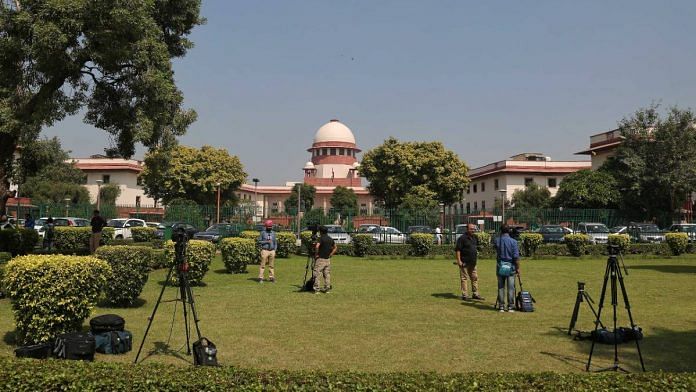New Delhi: Whether a woman is “habitual to sexual intercourse” is irrelevant for determining whether she was raped, the Supreme Court observed Monday, while reiterating that the “two-finger test” should not be conducted and any person found doing so in sexual assault cases would be held guilty of misconduct.
A bench comprising Justices D.Y. Chandrachud and Hima Kohli asserted: “The so-called test is based on the incorrect assumption that a sexually active woman cannot be raped. Nothing could be further from the truth — a woman’s sexual history is wholly immaterial while adjudicating whether the accused raped her.”
The “two-finger test” involves “insertion” of two fingers into the vagina of a woman to determine its “laxity” and assess whether she is “habitual to sexual intercourse”.
The bench referred to its previous judgments to observe: “This court has time and again deprecated the use of this regressive and invasive test in cases alleging rape and sexual assault.”
The court further emphasised that the “the probative value of a woman’s testimony does not depend upon her sexual history”.
The bench was hearing an appeal challenging a judgment passed by the Jharkhand High Court in January 2018, acquitting one Shailendra Kumar Rai alias Pandav Rai in a 2004 rape case.
The victim in this case was subjected to the “two-finger test” in November 2004 when she was medically examined.
In 2013, the SC had ruled that the “two-finger test” on a rape victim violates her right to privacy, integrity and dignity.
Also read: Long years of apathy on Constitution Bench over. Supreme Court set to make more headlines
‘Regrettable’
During Monday’s hearing, the court noted that while the “two-finger test” in the above-mentioned rape case was conducted over a decade ago, it is “a regrettable fact” that it continues to be done even today.
It observed: “Whether a woman is ‘habituated to sexual intercourse’ or ‘habitual to sexual intercourse’ is irrelevant for the purposes of determining whether the ingredients of Section 375 of the Indian Penal Code (pertaining to rape) are present in a particular case.”
The court also said the test has no scientific basis and that it “neither proves nor disproves allegations of rape”. The test instead “re-victimises and re-traumatises women who may have been sexually assaulted, and is an affront to their dignity,” it added.
The bench asserted that it is “patriarchal and sexist to suggest that a woman cannot be believed when she states that she was raped, merely for the reason that she is sexually active”.
The court further declared that any person who conducts the “two-finger test” while examining an alleged survivor of sexual assault shall be held guilty of misconduct.
It directed the central and state governments to conduct workshops for health providers, informing them of the appropriate procedure to be adopted while examining survivors of sexual assault and rape.
The governments were also asked to review the curriculum in medical schools to ensure that the test is not prescribed as one of the procedures for examining survivors of sexual assault and rape.
‘Dying declaration proved rape’
According to the prosecution in the case, Rai had raped the victim in November 2004. When she called out for help, he poured kerosene on her and set her on fire. While in hospital, the victim had narrated the entire incident to a police officer. She succumbed to her injuries a month later, in December 2004.
The sessions court convicted Rai in October 2006, under Sections 302 (murder), 341 (wrongful restraint), 376 (rape) and 448 (house trespass) of the IPC and sentenced him to life imprisonment. However, the Jharkhand High Court in 2018 overturned the sessions court judgment, ruling that the prosecution had not proved its case beyond reasonable doubt.
The Supreme Court, though, felt that the victim’s dying declaration proved her case.
Rai’s lawyer had also submitted that the medical board had not found any evidence of rape, but the apex court noted that the medical board report had said the possibility of intercourse could not be ruled out.
“A lack of medical evidence as to the commission of rape cannot be taken to mean that no rape was committed upon the deceased. Her dying declaration unequivocally states that the respondent raped her before setting her on fire and there is no rule mandating the corroboration of the dying declaration through medical or other evidence, when the dying declaration is not otherwise suspicious,” the court observed.
It went on to reverse Rai’s acquittal and sentenced him to life imprisonment.
As “parting remarks”, the SC judgment noted that Section 53A of The Indian Evidence Act, 1872, was inserted in 2013. The provision says that the evidence of a victim’s character or of her previous sexual experience shall not be relevant to the issue of consent in sexual offence cases.
Additionally, the Ministry of Health and Family Welfare issued guidelines in 2014 prohibiting the “two-finger test” in rape and sexual assault cases.
The Supreme Court has directed the central and state governments to ensure that the guidelines are circulated in all government and private hospitals.
(Edited by Nida Fatima Siddiqui)
Also read: Marriage of 15 yr Muslim girl not void under Prohibition of Child Marriage Act, says high court



